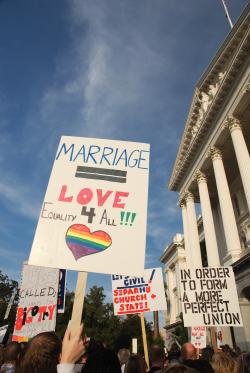I’ve been working from Spain for the past two weeks, and one of the conversations I’ve had over and over again with my gay Spanish friends is the state of the gay marriage movement back in the United States. Spain has had marriage equality since 2005, and the issue, as one friend described it over dinner, “doesn’t really matter to anyone now.” With President Obama’s announcement a few weeks ago that he now supports same-sex marriage, my companion had the impression that the question had been settled for us, too.
Not so, I was forced to explain. As I watched his eyes glaze over during a lengthy explanation of the American legislative and legal systems (the relatively weak power of the Oval Office, the possibility of differences between state laws, the complexities of our judicial hierarchy, etc.), I was reminded that, even in this moment of forward momentum on marriage equality, nothing is certain, and a sudden stop or setback is not at all out of the question.
So when I read that the Defense of Marriage Act (DOMA) had been declared unconstitutional by the U.S. Court of Appeals for the First Circuit in Boston yesterday, the news brought equal parts happiness and concern. Clearly, this is a necessary step on the road to a real conclusion in the Supreme Court; the case is one of a handful now inching their way toward the justices, and this most recent advancement could mean that some kind of decision (probably narrowly focused on federal treatment of already married couples and not a fundamental right to marry) could be rendered as soon as next year.
But as we crawl slowly up those steps, I hope that these important—but still indefinite—decisions and symbolic gestures don’t mislead us into assigning inevitability to something that remains highly contingent. There’s a lot of work yet to do, and just because the president or a lower court make headlines in support of marriage equality doesn’t mean we can just sit back and wait for it to happen. Our democracy requires not only its citizens’ patience, but also their vigilant participation.
